Tattoos and Art: The artist’s perspective
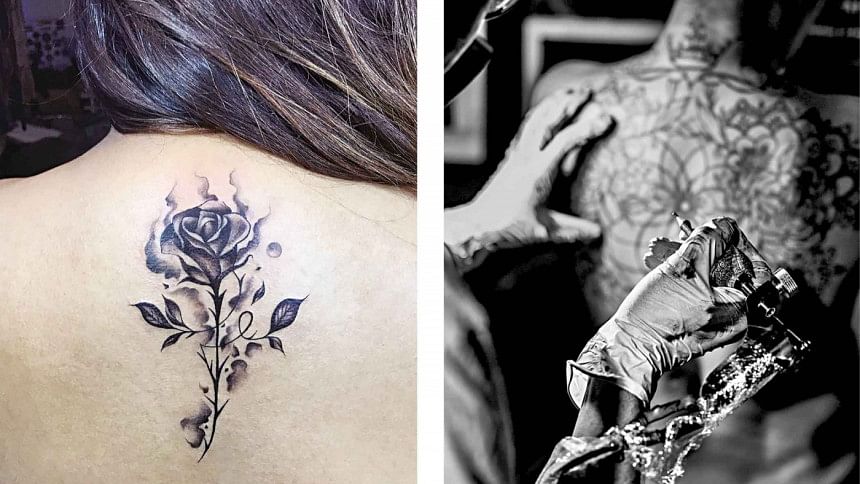
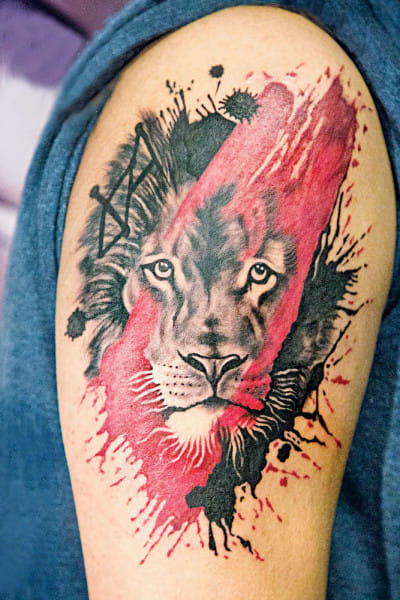
As an illustrative form of self-expression, tattoos make one's body their own personalised art gallery marked with creativity.
InkPark Tattoo Studio's Avijit Saha says, "Just as an artist paints on white paper, the human body is like a canvas to a tattoo artist."
As such, tattoos become a permanent part of oneself.
Nyeem Mahmud from Exotic Piercing BD says, "Tattoos boost one's spirituality, inner beauty, and make one feel more confident."
As tattoos have this unique empowering quality, it is crucial that getting a tattoo today does not result in regret tomorrow.
Saha, being creatively fuelled, says, "I ink tattoos to express the hidden feelings, expressions and personalities. Tattoos become art with an artist's touch. When you get tattooed, your body mirrors your expression."
Although it may look vehement, getting inked is a decision requiring careful thought. Saha wishes that people would not choose their designs randomly.
Olin from Olins tattoo Studio, an experimental and self-taught tattoo artist who has been tattooing for over a decade, wholeheartedly believes that tattoos are not for everyone. If one cannot connect to the art form and the story behind the tattoo, getting tattooed is not worth the investment.
The idea of trends and trendiness cannot be applied to tattoos. Olin stresses that tattoos cannot be a trend. With it being a permanent mark on the body, there needs to be a personal connection, something relatable.
Recently, Olin has noticed an increase of Bengali calligraphy tattoos. While more people begin embracing tattoos parallel to their culture, the Bengali phrases and words hold individual and special meaning. Other than that, Saha has seen an increase of smaller tattoos and name tattoos and being style conscious, people are beginning to show interest in larger tattoos.
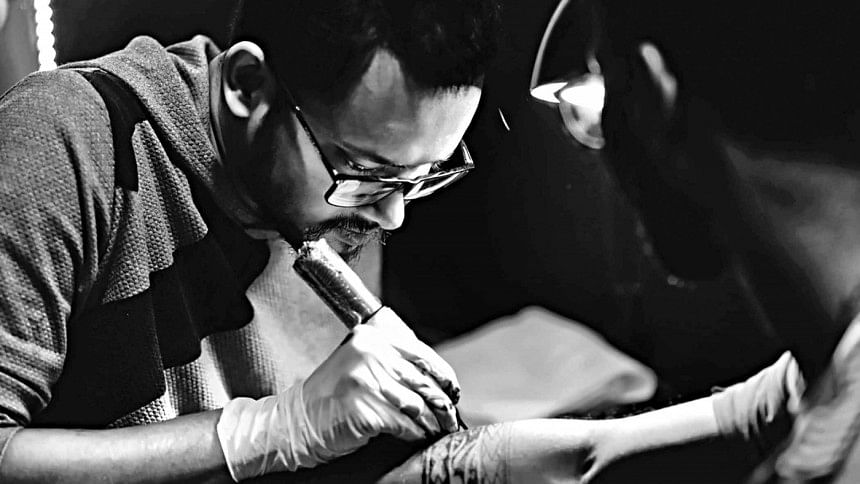
Tattoos have a wide range of styles. Starting from minimalism and detailed to realism and glitch, traditional and symbols, each style has its own unique flare.
"Tattoos are a commitment," says Nyeem.
Oftentimes, Olin advises his clients to come back to him a month or so later. If they still want a tattoo, only then would he go through with it. Artists emphasise repeatedly how important it is to be absolutely positive about getting a tattoo with no hints of regret or doubt, especially since tattoo removal could be harmful and cover-ups are not always easy.
First timers are advised to look past the social dogma but not go all out with their tattoo design. Olin and Saha both advise going for smaller and minimalist tattoos. Moreover, Olin and Nyeem both argue that the stigma surrounding tattoos will always exist and people will always have something negative to say.
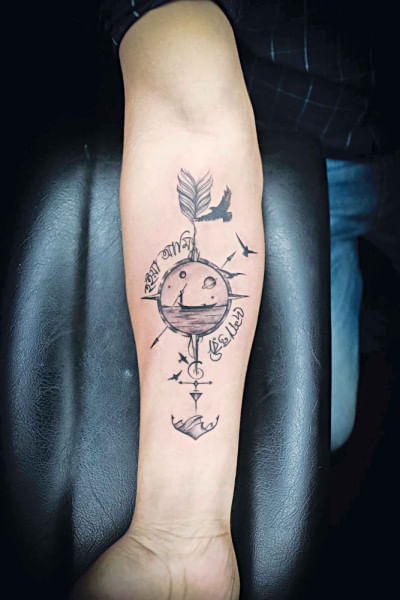
It remains imperative that we do not allow someone else's prejudice to cloud our decision. In this regard, Saha is hopeful that things are changing, saying, "People are trying to respect the art and the artist more than before".
Once decided on a tattoo, there are some things which need to be kept in mind.
Tattoo artists are like other professionals. They have turned their passion into their career. Asking them to copy another artist's work is disrespectful and represses their creativity. Additionally, tattoo artists, like all other professionals, pay their bills with their work. Hence, bargaining will not do any favours. The bigger the tattoo and more detailed it is, the more the price.
Trust the artist. To establish this trust, Olin does not do walk-ins. Appointments allow him to get to know his client, have a one-on-one conversation and understand their story so that he can reproduce it creatively.
Allowing for a detailed creative collaboration between you and the artist is what will make a tattoo unique to oneself. For a perfect tattoo, Saha says, "There needs equal contribution from both sides." With that being said, asking for someone to speak for your design or influence it is something Nyeem strongly opposes. The design itself needs to resonate with your story and take shape through the artist's visualisation. However, bringing along a friend for company is preferred.
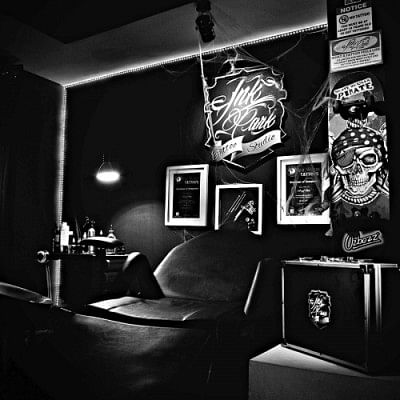
Being prepared mentally plays a significant role. Consulting the tattoo artist to know what to expect is wise. Not only does one need to sit still while enduring a certain level of pain, but there is a possibility that the tattoo could take multiple sessions to complete, especially bigger tattoos.
Most importantly, listen to the tattoo artist's instructions on how to take care of the tattoo afterwards.
It is established that tattoos require a lot of thought. However, there are instances where, despite being determined to get tattooed, you probably should not.
While going through hard times, such as a breakup, when your judgment is clouded, is definitely when you should not be getting tattooed. Olin and Saha both insist that getting a tattoo before 18 years of age is not a good idea. Although Olin's studio caters to clients above 18 years old, he argues that one should get a tattoo around 26-27 years of age as by then, people usually have the maturity and also the life experiences to decide on a tattoo and it's design.
What if you still regret your tattoo? If the tattoo can be safely removed or covered up, then the problem is solved. If not, then fixating upon it will not eliminate the regret. Olin advises these regretful souls to make it into a funny story.
Tattoos are a combination of art and philosophy. With its permanency, tattoos tell a timeless and life long story. Getting tattooed is a beautiful way to mark one's body with creativity, stories and expression.
Final words of advice— Think. Think. Think. You can never be too sure.
Photo courtesy: InkPark Tattoo Studio and Olins tattoo Studio
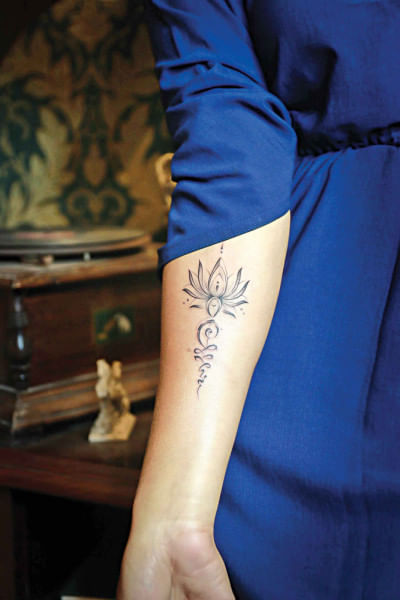
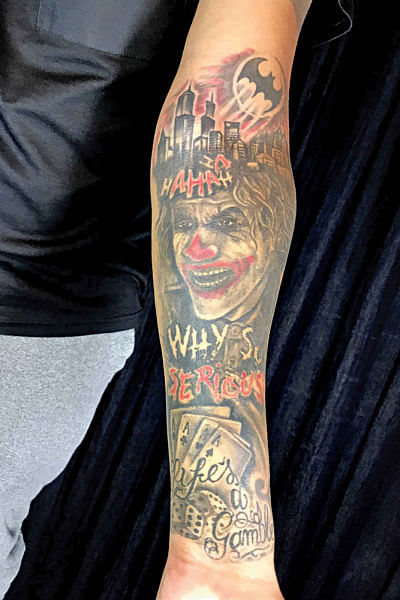

 For all latest news, follow The Daily Star's Google News channel.
For all latest news, follow The Daily Star's Google News channel. 



Comments